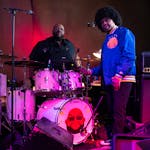Editor's note: This review first appeared in the Star Tribune on Nov. 4, 1987.
Six years ago, Rolling Stone labeled the Irish rock band U2 the "next big thing." The magazine is prone to such hyperbolic, self-important statements. But this time it has come true.
In the past year, the torch has passed from the Who and the Rolling Stones to U2, a 9-year-old quartet from Dublin. U2 is simply the most important group in popular music. It's not just a matter of hit singles (U2 had two No. 1 songs this year) and a best-selling album ("The Joshua Tree" spent nine weeks at No. 1). It's the way the band makes an impact on its public as well as the magnitude of the public. It's the way U2's performances become events instead of concerts.
Nearly 18,000 U2 worshippers were primed for an event Tuesday night at the sold-out St. Paul Civic Center. But U2 didn't transform the concert into an event until 45 minutes into the 100-minute performance. When the band tore into "Exit" and "In God's Country," it galvanized the crowd in much the same way that U2 had in its legendary performances at Live Aid in 1985 and during last year's Amnesty International "Conspiracy of Hope Tour." For the rest of the night, it was the kind of celebration expected from rock's "big thing."
There's a communal spirit that connects bands that matter, such as U2, with their fans. It's devotion more than the fleeting hero worship associated with pop idols whose hits are forgotten six months later. And the U2 devotion extends to a special kind of commitment.
Less visceral than the Stones or the Who, U2 appeals to both the heart and the mind. Its music has a romantic, poetic side as well as an active side, challenging listeners to deal with inner and societal conflicts. Most importantly is the emotional texture that runs through U2's work. It's not the literal meaning of the lyrics, the music itself or the way the band delivers its material but rather a combination of the forces that makes U2 so powerful.
The band has more sonic allure than any other chart-topper since the Police. Haunting beauty sculpted by Dave (the Edge) Evans' guitar and synthesizers paints pretty soundscapes. Drummer Larry Mullen and bassist Adam Clayton lay down rhythms that complement rather than drive the music, as is the case with most rock music. And Bono Hewson's passionate wail, populist gestures and socially conscious lyrics tie it all together.
Last night, Hewson seemed calmer and more controlled than in previous Twin Cities performances. He didn't dash out into the crowd or wave any white flags. The man with the Will Rogers hat would wave his fist and the crowd would respond in kind like Hitler youth. He would wrap a fan's homemade banner around his shoulders. But early in the concert he couldn't quite summon the spirit that has made him a deserving (albeit reluctant) Rolling Stone cover-boy.
Hewson's sidemen failed to elevate such familiar U2 anthems as "Sunday Bloody Sunday" and "New Year's Day" to their usual climactic peaks. (Those usual showstoppers came early in the concert.) Then "Exit" became the departure, followed by brief choruses of the Doors' "Riders of the Storm" and Them's "Gloria." Suddenly U2's energy was focused. Hewson then offered "In God's Country" and a Dylanesque reading of the Beatles' "Help."
Thereafter the band conquered with such U2 staples as "Surrender," "With or Without You" and "Pride (In the Name of Love)." The evening ended with musicians leaving as the audience continued to sing the final song, "40."
Opening the concert was the BoDeans, a quintet from Waukesha, Wis., that, like Marshall Crenshaw, plays vintage pop-rock with style.




